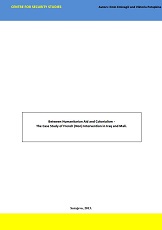Between Humanitarian Aid and Colonialism - The Case Study of French (Non) Intervention in Iraq and Mali.
Between Humanitarian Aid and Colonialism - The Case Study of French (Non) Intervention in Iraq and Mali.
Author(s): Emin Eminagić, Viktoria Potapkina
Subject(s): International relations/trade, Military policy, Developing nations, Geopolitics
Published by: Centar za Sigurnosne Studije
Summary/Abstract: This paper is designed as a comparative case study of France’s (non) involvement in two regions – Iraq in 2003 and Mali in 2013. The time frame of ten years allows for a retrospective analysis of the possible decisions influencing French politicians to make the decision to not intervene in Iraq. The case of Mali is a rather new event and thus requires immediate attention to understand the underlying reasons for military action. Such a case study presents an intriguing opportunity for comparison. In regard to the case of the intervention in Iraq, France had immediate economic interests in the country, however, it, to this day, remains the most vocal opponent of the intervention, regardless of the fact that a large number of North Atlantic Treaty Organization (NATO) members participated in one way or another in the Operation Iraqi Freedom. In the case of Mali, France does not have any apparent economic interests in the region; however, it is the only NATO state carrying out the military operation in the country unilaterally as of writing of this paper. However, it is not our intention to provide definitive answers on certain points of involvement and non-intervention, nor mark processes, but rather to provide a grassroot analysis on the case study of Mali that would potentially best explain particular aspects of theoretical implications. With the aim of presenting and analyzing two different choices of French foreign policy, this paper will make use of the tools of comparative analysis in order to construct an interpretivist case study. Academic books and articles, direct speeches of involved politicians, various economic statistical data, opinion polls, as well as United Nations (UN) Reports will be used in the analysis. It will look at theoretical ramifications as well as empirical data from relevant research institutions, using data gathered from United Nations Security Council (UNSC) reports regarding peace building in post-conflict zones as an initial starting point.
Series: Centar za Sigurnosne Studije - RESEARCH
- Page Count: 18
- Publication Year: 2013
- Language: English
- Content File-PDF

